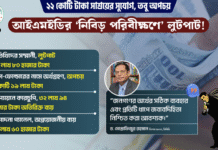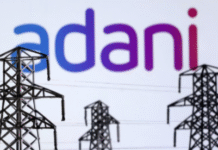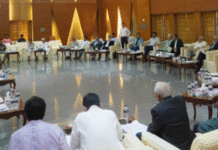Encroachment, pollution continue at Buriganga, Turag, Sitalakkhya and Balu

Pollution in and encroachment on the Buriganga continue unchecked despite different initiatives to save the river. The photo was taken at Babubazar on Tuesday.
The government taskforce formed to save the rivers flowing around the capital city — Buriganga, Turag, Sitalakkhya and Balu – have failed miserably to stop the rampant encroachment and mindless pollution of the water bodies.
The High Court in 2009 directed the government to take appropriate steps to
stop encroachment, earth-filling, and construction of illegal structures on the Buriganga, Turag, Balu and Sitalakkhya rivers and to evict the already built illegal structures.
Recent visits to the banks and floodplains of the four rivers in Dhaka, Narayanganj, Gazipur and Munshiganj revealed fresh encroachment and the unchecked discharge of untreated toxic wastes into the rivers.
The Department of Environment collected samples from the country’s major rivers, including of the four rivers, to prepare its River Water Quality Report since 2010.
According to the RWQ reports, during the dry season (from January to May), the level of Dissolved Oxygen in Buriganga, Turag, Balu and Sitalakkhya rivers was nil at almost all points of sample collection when the standard level of DO for fisheries is greater than or equal to 5mg per litre.
A recent study of UNDP on water quality of the four rivers observed the security of water supply to the Dhaka city and its fishery was seriously endangered by the deteriorating water quality of the rivers.
It also found that most liquid waste was discharged untreated into the rivers while regulations were openly flouted and the regulators often felt unable to take due measures against the practice.
Syeda Rizwana Hasan, chief executive of Bangladesh Environmental Lawyers Association, said that the government’s initiatives, those that had been taken under the pressure of the court to revive the four rivers, remained only on paper.
DoE director (monitoring and enforcement) AKM Mizanur Rahman, however, said they were regularly sending notice to the industries that dumped waste in the rivers and imposing fines on them.
Encroachers in recent times have reached the beds of the rivers at some places, ignoring the demarcation pillars the authorities installed following the High Court order.
A total 4,063 boundary pillars had been installed at the banks of Buriganga, Sitalakhya, Balu, Turag and Dholeswari rivers and of the pillars, 422 were not set up at the right place, 264 were damaged, 148 were not visible and 36 pillars were not found, according to the resolution of 30th meeting of the national taskforce for protecting the four rivers from pollution and grabbing.
At Buriganga River, from Sadarghat to Postagola and Sadarghat to Ramchandrapur, numerous establishments have been built on the riverbank and many establishments are under construction encroaching into the space of the river.
The encroachment appeared rampant at Kamrangirchar and Basila area.
The encroachers have occupied the Balu River from both side from Rupganj in Narayanganj to Kaliganj in Gazipur district and have already developed its flood basin for different projects.
At Shashanghat area, some six kilometers away from city’s Natunbazar intersection of Baridhara residential area, the river has been grabbed from both side by realtors.
RAJUK has occupied vast areas of the river bank for its Purabachal New Town Project while the flood basin of the river had already been developed for housing projects.
Many portions of the Turag River had lost its navigability because of shrinking space due to encroachment along the river from both sides.
Just near Sinnirtek Landing station of Bangladesh Inland Water Transportation Authority in Mirpur, the river has been encroached from both sides by land-filling on the bank and bed of the river just under the nose of BIWTA.
From Sinnirtek to Birulia Bridge, both the banks of the river have been encroached and the riverbed filled up near the bridge for a freedom fighters’ housing project named Muktijuddha Palli Punorbasan Kendra and Dhaka Boat Club.
Hundreds of industries including a large urea fertilizer factory and thermal power plant as well as the textile and dyeing factories, have been set up along Sitalakshya River from Ghurashal to Munshiganj through encroachment and they are the main sources of pollution into it.
RAJUK has encroached upon the river near Kanchon Bridge for developing its Purbachal New Town and even its project office has been constructed on its bank.
The government formed a high-powered task force to save Dhaka’s rivers in 2009, which was later extended to include other rivers in the country, headed by the shipping minister Shajahan Khan, LGRD and cooperatives minister, land minister, housing and public works minister, environment minister, law minister and top officials of the government.
The prime minister, Sheikh Hasina, on May 19, 2014, chairing a weekly cabinet meeting at the secretariat ordered the ministries concerned to retrieve all the rivers flowing along Dhaka city from land grabbers, irrespective of their identities, in the wake of the authorities and taskforce’s failure to evict them.
Sharif Jamil, joint secretary of Bangladesh Paribesh Andolon, said the BIWTA sometimes conducted eviction drives against encroachment, which was nothing but an eyewash as none of the big establishments on the riverbank were evicted till date.
BIWTA chairman commodore Mozammel Haque told New Age that the BIWTA had launched an extensive eviction drive to free the encroached river banks and taken projects to construct walkways on the freed land.
‘We have already constructed walkways at some points of the rivers including at Gabtali, Aminbazar, Kanchpur and Shyampur,’ he said.
‘We are policymaking body and we cannot enforce things, we can only make recommendations. We are however working to save the rivers,’ said joint secretary (task force) of the shipping ministry Nur-Ur-Rahman.
The High Court in 2009 directed the government to take appropriate steps to
stop encroachment, earth-filling, and construction of illegal structures on the Buriganga, Turag, Balu and Sitalakkhya rivers and to evict the already built illegal structures.
Recent visits to the banks and floodplains of the four rivers in Dhaka, Narayanganj, Gazipur and Munshiganj revealed fresh encroachment and the unchecked discharge of untreated toxic wastes into the rivers.
The Department of Environment collected samples from the country’s major rivers, including of the four rivers, to prepare its River Water Quality Report since 2010.
According to the RWQ reports, during the dry season (from January to May), the level of Dissolved Oxygen in Buriganga, Turag, Balu and Sitalakkhya rivers was nil at almost all points of sample collection when the standard level of DO for fisheries is greater than or equal to 5mg per litre.
A recent study of UNDP on water quality of the four rivers observed the security of water supply to the Dhaka city and its fishery was seriously endangered by the deteriorating water quality of the rivers.
It also found that most liquid waste was discharged untreated into the rivers while regulations were openly flouted and the regulators often felt unable to take due measures against the practice.
Syeda Rizwana Hasan, chief executive of Bangladesh Environmental Lawyers Association, said that the government’s initiatives, those that had been taken under the pressure of the court to revive the four rivers, remained only on paper.
DoE director (monitoring and enforcement) AKM Mizanur Rahman, however, said they were regularly sending notice to the industries that dumped waste in the rivers and imposing fines on them.
Encroachers in recent times have reached the beds of the rivers at some places, ignoring the demarcation pillars the authorities installed following the High Court order.
A total 4,063 boundary pillars had been installed at the banks of Buriganga, Sitalakhya, Balu, Turag and Dholeswari rivers and of the pillars, 422 were not set up at the right place, 264 were damaged, 148 were not visible and 36 pillars were not found, according to the resolution of 30th meeting of the national taskforce for protecting the four rivers from pollution and grabbing.
At Buriganga River, from Sadarghat to Postagola and Sadarghat to Ramchandrapur, numerous establishments have been built on the riverbank and many establishments are under construction encroaching into the space of the river.
The encroachment appeared rampant at Kamrangirchar and Basila area.
The encroachers have occupied the Balu River from both side from Rupganj in Narayanganj to Kaliganj in Gazipur district and have already developed its flood basin for different projects.
At Shashanghat area, some six kilometers away from city’s Natunbazar intersection of Baridhara residential area, the river has been grabbed from both side by realtors.
RAJUK has occupied vast areas of the river bank for its Purabachal New Town Project while the flood basin of the river had already been developed for housing projects.
Many portions of the Turag River had lost its navigability because of shrinking space due to encroachment along the river from both sides.
Just near Sinnirtek Landing station of Bangladesh Inland Water Transportation Authority in Mirpur, the river has been encroached from both sides by land-filling on the bank and bed of the river just under the nose of BIWTA.
From Sinnirtek to Birulia Bridge, both the banks of the river have been encroached and the riverbed filled up near the bridge for a freedom fighters’ housing project named Muktijuddha Palli Punorbasan Kendra and Dhaka Boat Club.
Hundreds of industries including a large urea fertilizer factory and thermal power plant as well as the textile and dyeing factories, have been set up along Sitalakshya River from Ghurashal to Munshiganj through encroachment and they are the main sources of pollution into it.
RAJUK has encroached upon the river near Kanchon Bridge for developing its Purbachal New Town and even its project office has been constructed on its bank.
The government formed a high-powered task force to save Dhaka’s rivers in 2009, which was later extended to include other rivers in the country, headed by the shipping minister Shajahan Khan, LGRD and cooperatives minister, land minister, housing and public works minister, environment minister, law minister and top officials of the government.
The prime minister, Sheikh Hasina, on May 19, 2014, chairing a weekly cabinet meeting at the secretariat ordered the ministries concerned to retrieve all the rivers flowing along Dhaka city from land grabbers, irrespective of their identities, in the wake of the authorities and taskforce’s failure to evict them.
Sharif Jamil, joint secretary of Bangladesh Paribesh Andolon, said the BIWTA sometimes conducted eviction drives against encroachment, which was nothing but an eyewash as none of the big establishments on the riverbank were evicted till date.
BIWTA chairman commodore Mozammel Haque told New Age that the BIWTA had launched an extensive eviction drive to free the encroached river banks and taken projects to construct walkways on the freed land.
‘We have already constructed walkways at some points of the rivers including at Gabtali, Aminbazar, Kanchpur and Shyampur,’ he said.
‘We are policymaking body and we cannot enforce things, we can only make recommendations. We are however working to save the rivers,’ said joint secretary (task force) of the shipping ministry Nur-Ur-Rahman.
Source: New Age









